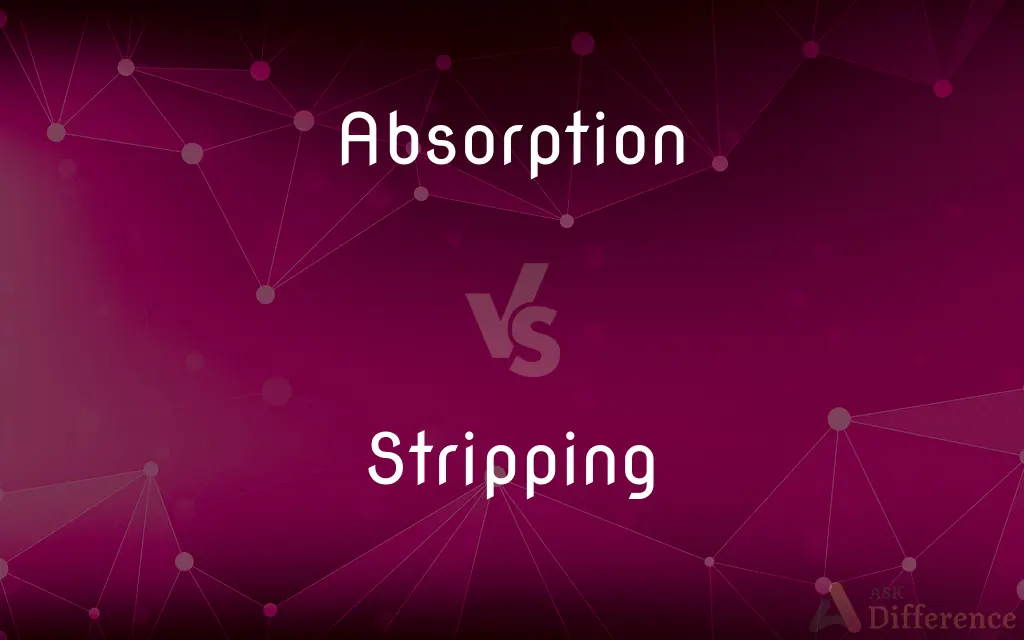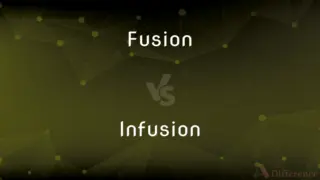Absorption vs. Stripping — What's the Difference?
By Urooj Arif & Fiza Rafique — Updated on May 15, 2024
Absorption involves capturing one or more substances in a liquid or solid, while stripping is the process of removing components from a liquid using a gas.

Difference Between Absorption and Stripping
Table of Contents
ADVERTISEMENT
Key Differences
Absorption occurs when a gas or vapor phase is dissolved by a liquid or solid phase, commonly seen in chemical scrubbing processes. In contrast, stripping involves the removal of a solute from a liquid by contacting it with a gas, often used to purify liquids.
In absorption, the objective is often to remove contaminants from a gas stream, as seen in industrial gas cleaning. Conversely, stripping aims to liberate substances from a liquid phase, making it essential in water treatment technologies.
Absorption processes utilize absorbents such as water or chemicals to capture gases or vapors, ensuring pollutants are contained. Meanwhile, stripping processes use a countercurrent flow of gas to maximize the extraction of solutes from the liquid.
Equipment used in absorption includes towers filled with packing material to maximize gas-liquid contact. On the other hand, stripping also uses similar towers but focuses on efficient gas flow to strip solutes from the liquid.
Absorption efficiency can be influenced by factors like temperature and pressure, where lower temperatures often enhance performance. Whereas, in stripping, higher temperatures can promote the removal of volatile components, showcasing a contrasting operational preference.
ADVERTISEMENT
Comparison Chart
Objective
Capture contaminants from gas streams
Remove contaminants from liquid streams
Common Uses
Gas cleaning, CO2 capture
Water treatment, solvent recovery
Operational Focus
Maximizing gas-liquid contact
Maximizing gas flow to strip solutes
Equipment Type
Packed towers, scrubbers
Packed towers, distillation columns
Temperature Influence
Lower temperatures enhance performance
Higher temperatures enhance performance
Compare with Definitions
Absorption
The process of one substance being retained by another.
CO2 absorption by seawater helps reduce atmospheric levels.
Stripping
The act of removing one or more components from a liquid.
Stripping volatile organics from wastewater is essential in treatment plants.
Absorption
In acoustics, the damping of sound.
Sound absorption materials are used in studios to improve acoustics.
Stripping
A process in which a gas is used to remove solutes from a liquid.
Air stripping is employed to decontaminate polluted groundwater.
Absorption
A method used to remove pollutants from industrial gases.
Absorption towers are critical in chemical plants for air purification.
Stripping
Used in chemical analysis to recover dissolved substances.
Steam stripping extracts essential oils from plant materials.
Absorption
The act or process of absorbing or the condition of being absorbed.
Stripping
Refers to the separation process in column distillation.
The stripping section of a distillation column increases the purity of the output.
Absorption
A state of mental concentration.
Stripping
To remove clothing or covering from
Stripped the beds.
Absorption
The act or process of absorbing or of being absorbed as,
Stripping
To remove or take off (clothing or covering)
Stripped off his shirt.
Absorption
(obsolete) engulfing; swallowing up, as of bodies or land.
Stripping
To remove an exterior coating, as of paint or varnish, from
Stripped the cabinets.
Absorption
Assimilation; incorporation.
The absorption of a smaller tribe into a larger
The absorption of bodies in a whirlpool
Stripping
To remove the leaves from the stalks of (tobacco, for example).
Absorption
The imbibing or reception by molecular or chemical action, of radiant energy; the process of being neutrons being absorbed by the nucleus; interception.
The absorption of light, heat, electricity, etc.
Stripping
To clear of a natural covering or growth; make bare
Strip a field.
Absorption
(meteorology) The process in which incident radiant energy is retained by a substance (such as an air mass) by conversion to some other form of energy (such as heat).
Stripping
To deprive of possessions, office, rank, privileges, or honors; divest
The court stripped him of his property.
Absorption
(physiology) in living organisms, the process by which the materials of growth and nutrition are absorbed and conveyed to the tissues and organs; taking in by various means, such as by osmosis.
Stripping
To rob of wealth or property; plunder or despoil
Stripped the palace of its treasures.
Absorption
Entire engrossment or occupation of the mind.
Absorption in some employment
Stripping
To remove equipment, furnishings, or accessories from
They stripped down the car to reduce its weight.
Absorption
Mental assimilation.
Stripping
To remove nonessential detail from; reduce to essentials
The director stripped down her style of filmmaking.
Absorption
(electrical engineering) The retaining of electrical energy for a short time after it has been introduced to the dielectric.
Stripping
To dismantle (a firearm, for example) piece by piece.
Absorption
The act or process of absorbing or sucking in anything, or of being absorbed and made to disappear; as, the absorption of bodies in a whirlpool, the absorption of a smaller tribe into a larger.
Stripping
To damage or break the threads of (a screw, for example) or the teeth of (a gear).
Absorption
An imbibing or reception by molecular or chemical action; as, the absorption of light, heat, electricity, etc.
Stripping
To draw and discard the first drops of milk from the udder of (a cow or goat, for example) at the start of milking.
Absorption
In living organisms, the process by which the materials of growth and nutrition are absorbed and conveyed to the tissues and organs.
Stripping
To draw the last drops of milk from the udder of (a cow or goat, for example) at the end of milking.
Absorption
Entire engrossment or occupation of the mind; as, absorption in some employment.
Stripping
To extract the milt or roe from (a live fish).
Absorption
(chemistry) a process in which one substance permeates another; a fluid permeates or is dissolved by a liquid or solid
Stripping
To draw in (a fishing line) by hand, as between casts with a fly rod.
Absorption
(physics) the process in which incident radiated energy is retained without reflection or transmission on passing through a medium;
The absorption of photons by atoms or molecules
Stripping
To mount (a photographic positive or negative) on paper to be used in making a printing plate.
Absorption
The social process of absorbing one cultural group into harmony with another
Stripping
To undress completely.
Absorption
The process of absorbing nutrients into the body after digestion
Stripping
To perform a striptease.
Absorption
Complete attention; intense mental effort
Stripping
To fall away or be removed; peel
The wallpaper strips away easily.
Absorption
The mental state of being preoccupied by something
Stripping
To cut or tear into strips.
Absorption
A physical or chemical phenomenon where atoms, molecules, or ions enter some bulk phase.
Absorption of sunlight by the ozone layer protects Earth.
Stripping
A striptease.
Absorption
In optics, the uptake of light by a material.
UV absorption by sunglasses protects the eyes.
Stripping
A long narrow piece, usually of uniform width
A strip of paper.
Strips of beef.
Stripping
A long narrow region of land or body of water.
Stripping
A comic strip.
Stripping
An airstrip.
Stripping
An area, as along a busy street or highway, that is lined with a great number and variety of commercial establishments.
Stripping
Present participle of strip
Stripping
The act of one who strips.
Stripping
A physical separation process where one or more components are removed from a liquid stream by a vapor stream
Stripping
The act of one who strips.
The mutual bows and courtesies . . . are remants of the original prostrations and strippings of the captive.
Never were cows that required such stripping.
Stripping
The last milk drawn from a cow at a milking.
Stripping
The removal of covering
Stripping
In material processing, the removal of layers or coatings.
Paint stripping involves chemicals or heat to remove old paint.
Common Curiosities
What is absorption used for in industrial applications?
Absorption is primarily used for removing contaminants from gas streams and for capturing CO2.
What is the main purpose of stripping in water treatment?
Stripping is used to remove contaminants like volatile organic compounds from water.
What types of equipment are common in absorption processes?
Absorption commonly involves the use of packed towers and scrubbers.
How do temperature and pressure affect absorption?
Lower temperatures and higher pressures generally improve absorption efficiency.
What gases are typically used in stripping processes?
Air or steam is commonly used to strip solutes from liquids.
Can stripping be used to recover valuable chemicals?
Yes, stripping is often used to recover solvents and other valuable components from mixtures.
What materials are used as absorbents in absorption processes?
Common absorbents include water, activated carbon, and various chemical solvents.
Can absorption techniques be used in medical applications?
Yes, absorption can be used for drug delivery systems and in medical diagnostics.
How is stripping different from distillation?
Stripping is a part of distillation that specifically involves removing components from the liquid using a gas, whereas distillation involves vaporizing and then condensing a liquid to purify it.
What safety measures are essential in stripping operations?
Proper handling of gases and maintaining system integrity to prevent leaks are critical.
How do operational costs compare between absorption and stripping?
Costs vary widely based on the complexity of the solutes involved and the required purity levels.
Are absorption and stripping processes energy-intensive?
Both processes can be energy-intensive, depending on the scale and specific setup.
How does the design of a stripping column differ from an absorption column?
Stripping columns are designed to maximize contact between the rising gas and the descending liquid for efficient stripping.
What are the environmental impacts of absorption?
Absorption can help reduce pollution but also involves handling and disposal of used absorbents.
What is the future of stripping technology in environmental engineering?
Stripping technologies continue to advance, particularly in improving efficiency and reducing environmental impact.
Share Your Discovery

Previous Comparison
Fabric vs. Tissue
Next Comparison
Fusion vs. InfusionAuthor Spotlight
Written by
Urooj ArifUrooj is a skilled content writer at Ask Difference, known for her exceptional ability to simplify complex topics into engaging and informative content. With a passion for research and a flair for clear, concise writing, she consistently delivers articles that resonate with our diverse audience.
Co-written by
Fiza RafiqueFiza Rafique is a skilled content writer at AskDifference.com, where she meticulously refines and enhances written pieces. Drawing from her vast editorial expertise, Fiza ensures clarity, accuracy, and precision in every article. Passionate about language, she continually seeks to elevate the quality of content for readers worldwide.















































